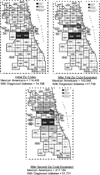Recruitment of Mexican American adults for an intensive diabetes intervention trial
- PMID: 21462723
- PMCID: PMC3704315
Recruitment of Mexican American adults for an intensive diabetes intervention trial
Abstract
Objective: Effective behavioral diabetes interventions for Mexican Americans are needed. Our study focused on efforts to recruit Mexican American adults for a trial testing a diabetes community health worker (CHW) self-management intervention.
Design: Behavioral randomized controlled trial, community-based participatory research approach.
Setting: Chicago.
Participants: Mexican American adults with type 2 diabetes.
Outcome measures: Screening and randomization.
Methods: Initial eligibility criteria included Mexican heritage, treatment with oral diabetes medication, residence in designated zip codes, planned residence in the area for two years, and enrollment in a specific insurance plan.
Results: Recruitment through the insurer resulted in only one randomized participant. Eligibility criteria were relaxed and subsequent efforts included bilingual advertisements, presentations at churches and community events, postings in clinics, partnerships with community providers, and CHW outreach. Zip codes were expanded multiple times and insurance criteria removed. CHW outreach resulted in 53% of randomized participants.
Conclusions: Despite strong ties with the target community, culturally appropriate recruitment strategies involving community representation, and a large pool of potential participants, significant challenges were encountered in recruitment for this diabetes intervention trial. Researchers identified three key barriers to participation: study intensity and duration, lack of financial incentives, and challenges in establishing trust. For future research to be successful, investigators need to recognize these barriers, offer adequate incentives to compensate for intervention intensity, and establish strong trust through community partnerships and the incorporation of community members in the recruitment process.
Figures



References
-
- Summary Health Statistics for U.S. Adults: 2007, Table 8, Centers for Disease Control and Prevention. [Accessed 18 January 2010];2009 Available from http://www.cdc.gov/nchs/data/series/sr_10/sr10_240.pdf.
-
- Age-Adjusted Percentage of Adults with Diabetes Reporting Visual Impairment by Race/Ethnicity, United States, 1997–2007; Centers for Disease Health Interview Survey; 2009. [Accessed 18 January 2010]; Available from http://www.cdc.gov/diabetes/statistics/visual/dtltable5.htm.
-
- Age-Adjusted Incidence of End-Stage Renal Disease Related to Diabetes Mellitus (ESRD-DM) per 100,000 Diabetic Population, by Race/Ethnicity and Sex, United States, 1980–2006; United States Renal Data System. [Accessed 18 January 2010];National Center for Chronic Disease Prevention and Health Promotion, Centers for Disease Control and Prevention. 2009 Available from http://www.cdc.gov/diabetes/statistics/esrd/Fig5Detl.htm.
Publication types
MeSH terms
Grants and funding
LinkOut - more resources
Full Text Sources
Other Literature Sources
Medical
